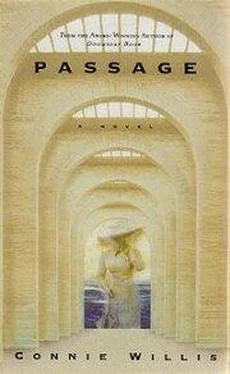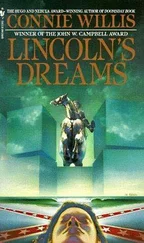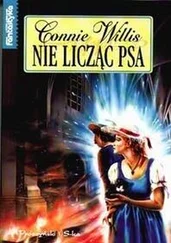Almost.
And that was what made people believe in angels and put frauds like Mandrake on the best-seller list, that desire to believe. But it didn’t bring them back. And it wasn’t the presence of the dead that haunted people, that made them imagine they saw them standing there in their NDEs. It was their absence. In places where they should have been.
Because Joanna wasn’t here, even in this place, where they had stood side by side, flattened against the wall, his arm stretched across her beating heart. There was nothing here, not even dust. She’s dead, he thought, and it was like coming face to face with it all over again.
He had somehow managed to deny it, in all his running around, making maps, graphing scans, questioning nurse’s aides, and he wondered now if that had been the point, if their obsession with Joanna’s last words had simply been another form of denial, their own private Grief Coping Strategies Seminar?
Because if they could decipher Joanna’s last words, it would make up for their having failed to save her. It would give the story a different ending. And how was that different from what Mandrake was trying to do?
He wondered suddenly if he had been just as deluded, if Joanna had murmured a few disjointed, delirious words, and he and Kit and Vielle had confabulated them into a message because it gave them something to think about, something to do besides grieving, besides giving way to despair, and Joanna’s words meant nothing at all.
No. “You were trying to tell me something,” he said to her, even though she wasn’t there. “I know you were.”
But she hadn’t succeeded. The machine had clicked off before she could finish. He thought of the message she had left on his answering machine. “A—” she had said, and he had played it over and over again, trying to decipher what she had started to say, but it was no use. There had been too many possibilities and not enough information. Like now, he thought, and knew, in spite of what he’d told Kit, that they would never find out.
In the movies they always found out who the murderer was, even though the victim died before she could tell them. In the movies, they always deciphered the message, solved the mystery, saved the girl. In the movies.
And maybe on the Other Side. But not on this side. On this side they never did find out what caused the Hartford circus fire or whether there was a bomb on the Hindenburg. On this side the doctor couldn’t stop the bleeding, help didn’t come in time, the message was too torn and stained to read.
“If anybody could have gotten a message through,” Joanna had said at Taco Pierre’s that night, “it was Houdini.” But that wasn’t true. If anybody could have gotten a message through, it was Joanna. She had tried, even when she was choking on her own blood, even when she should have been unconscious. If she could have come from where she was—in the grave or on the foundering decks of the Titanic or on the Other Side—to tell him her message, she would have.
But she couldn’t. Because she wasn’t anywhere. She’s gone, he thought, and buried his face in his hands.
He sat there a long time. His beeper went off once, startling in the silence, and he pulled it immediately out of his pocket, praying that it was Mrs. Aspinall calling to tell him Carl had changed his mind, but it was only Vielle, paging him to call her so she could report that she’d found another sub who’d worked the wrong end of the floor that day, or that she’d narrowed the cab Joanna had taken down to Yellow and Shamrock.
That wasn’t fair. Vielle had tried her best. They’d all tried their best. There were just too many pieces missing. The answer lay somewhere in the transcripts or the Titanic or the scans or English literature, but Joanna couldn’t tell them where, and Mr. Briarley, if he had ever known, could not remember. And Carl refused to tell.
And he, Richard, couldn’t figure it out. It was time to admit that. Time to face facts, pack it in, put on evening clothes and admit defeat.
Joanna would surely understand. She had watched the crash team trying CPR, norepinephrine, saline, paddles, one after the other. And she had been on the Titanic, which was all about trying and failing. The lookout hadn’t seen the iceberg in time, the Californian hadn’t heard the SOSs, hadn’t seen the Morse lamp’s signal, hadn’t understood the rockets. Assistant Engineer Harvey and the man he’d gone back to save had both drowned.
If there was any lesson to be learned from the Titanic, it was that attempts failed, rescue arrived too late, messages didn’t get through, and he knew, even as he thought it, that it wasn’t true.
The lesson of the Titanic was that people kept on trying even when they knew it was hopeless—tapping out SOSs, cutting the collapsibles free, going belowdecks and bringing the mail up, letting the dogs loose—all of them determined to save something, someone, even though they knew they couldn’t save themselves.
You can’t give up, Richard thought. Jack Phillips didn’t. Joanna didn’t.
“All right,” he said, and though he didn’t know it, his voice sounded just like Joanna’s on the answering machine.
He stood up. All right. Get Mrs. Hobbs’s number from Personnel. Find out who else was a patient on five-east that day. Find out who visited them. Go over the scans again, and the transcripts. Talk to Vielle. Talk to Bob Yancey. Go down trying.
He switched his pager back on and walked up the stairs, put out his hand to push the door open, and then ran back down to the landing. He tore the yellow tape free, ripping the trailing ends off the railing.
He carried the tangle of tape upstairs and out to the nurses’ station. A nurse was on the phone, her back to him. “The stairway down to second’s open. The paint’s dry,” he said, dumping the mass of tape on the counter. “Is Maurice Mandrake still in with Mrs. Davenport?”
“Hang on,” the nurse said into the phone. She half-turned and nodded at Richard.
“Thanks,” he said, and started down the hall toward the elevator.
“No, wait, Dr. Wright—” the nurse called, her hand over the mouthpiece, “—I didn’t realize it was you—” He came back to the nurses’ station. “Someone from the ER called looking for you. I didn’t realize you were on the floor or I would have come looking for you. It was just a few minutes ago—”
“Was it Vielle Howard?” he cut in.
“Yes, I think so. I asked the other nurses, but they didn’t think you’d been—”
“Did she say she wanted me to call her or come down to the ER?”
“She said there was someone waiting for you in your lab.”
“Man or woman?”
“Man,” the nurse said.
Carl Aspinall, he thought, and sprinted for the elevator. He changed his mind. He must have thought about what Kit said.
But when he got up to sixth, it wasn’t Carl standing outside the lab door.
It was Mr. Pearsall.
“A little while and I will be gone from among you, whither I cannot tell. From nowhere we came, into nowhere we go. What is life? It is a flash of a firefly in the night.”
—Last words of Crowfoot, a Blackfoot Indian chief
There were fireflies. They winked on and off in the darkness around her. I’m in Kansas, Joanna thought. This must be part of the Life Review. And she must be getting near the end of it if she was remembering her childhood, visiting her relatives in Kansas, running around in the dark with her cousins, a Mason jar in one hand to catch the fireflies in, and the brass lid in the other, ready to clap it on when you’d caught one, the grass wet against her ankles, the rich, sweet scent of peonies filling the evening air.
Читать дальше












